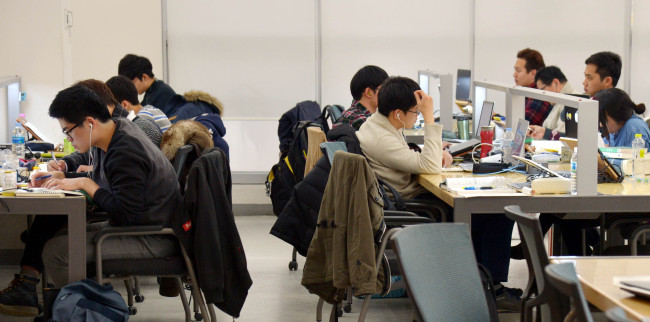South Korean government’s new education policy to foster individuals to meet the needs of the job market is sparking concerns about higher education becoming a prep school for job seekers at the demise of humanities studies.
Earlier this week, the Education Ministry confirmed its “higher education program to meet society’s needs,” which officials say will encourage local higher education institutes to undertake restructuring measures to train its students to acquire skills that are demanded by the market.
It is part of the government’s plan to tackle the youth unemployment issue, which has become so severe that the main opposition New Politics Alliance for Democracy leader Rep. Moon Jae-in called it a “national crisis.” As of June, the unemployment rate for those aged 15-29 was 10.2 percent. It marked a 10 percent increase from the year before.
The plan’s focal point is the Program for Industry Needs-Matched Education, or PRIME. The program will provide about 5 billion won-20 billion won ($4.3 million-$17.3 million) to each university or college conducting a restructuring process. Each university is encouraged to freely upsize or downsize their departments and even swap department size quotas with other institutions.
“How the reform will be carried out is basically up to each school. The ministry will provide the data on the number and type of jobs expected to be needed in the future, while colleges and universities will decide how to revamp their academic structure,” said a ministry official.
But education circles are concerned that the reform will ultimately result in colleges downsizing their humanities departments, whose graduates have struggled to gain relevant employment.
“The ministry appears to be saying that it will increase support for departments and universities that have high employment rates,” said a professor from a Seoul-based university, suspecting that the ministry has given in to demands of the industry.
The ministry itself appears to be mindful of the criticism that the new program is overly focused on the corporate sector. It even tweaked its original name from “higher education program to meet industry’s needs” to avoid such suspicion.
While the name change may have saved face, the essence of the program has virtually stayed the same since it was introduced in June.
Boosting the function of colleges and universities to better aid students’ job-seeking efforts was a key point emphasized by Han Seok-su, head of the ministry’s university policy office, and it remains so in the finalized plan.
 |
| Students at a Seoul-based university are studying in the university library in this March 2 file photo. (Kim Myung-sub/The Korea Herald) |
Over the past few years, such emphasis on employment has led to the demise of the humanities department. One of the major criteria used by the Education Ministry’s college evaluation since 2011 is the employment rate of their graduates. The universities who finish poorly in the evaluation are restricted from participating in state-funded projects. Government subsidies such as the state scholarship program can also be reduced.
Such focus on the employment rate has pushed local universities and colleges to trim their humanities departments, which have traditionally done poorly in the employment category. According to data from private education firm Haneul Education, the employment rate of humanities majors was 42.1 percent in 2015, lower than departments related to medicine, engineering, social studies, business, education, natural sciences and even arts. The employment rate for medicine-related and engineering majors were the highest of the lot at 66.8 percent and 66.7 percent, respectively.
From 2003 to 2013, the number of departments rose from 9,542 to 11,126, according to Education Ministry data provided by Rep. Kim Tae-nyeon of the main opposition New Politics Alliance for Democracy. During the same time, the number of departments related to humanities decreased by 1.7 percent.
In his recently released book, “Colleges That Became Monsters,” Pak No-ja, a Russian-born professor at the University of Oslo in Norway, criticized the rush to discard humanities departments. He said getting rid of a department just because not enough students applied is unprecedented anywhere else in the world.
The Education Ministry claims it can address the expected side effects by introducing measures to promote humanities, which it will implement in the latter half of this year to carry out in a two-track approach along with PRIME. Humanities classes will be provided as general education courses to all students, while humanities students will get basic technology and science-related education.
The officials said it will introduce humanities-related jobs that are expected to be prominent in the future.
But academics point out the plan lacks any incentive for universities and colleges to keep open their humanities departments. If anything, it practically invites colleges to slash them by enabling, and even encouraging the restructuring process with cash incentives, they said.
By Yoon Min-sik
(minsikyoon@heraldcorp.com)



